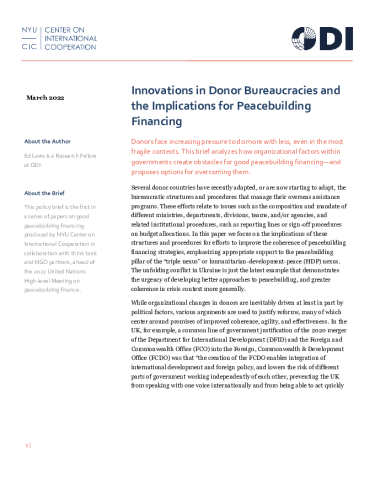Donors face increasing pressure to do more with less, even in the most fragile contexts. This policy brief analyzes how organizational factors within governments create obstacles for good peacebuilding financing—and proposes options for overcoming them.

Several donor countries have recently adapted, or are now starting to adapt, bureaucratic structures and procedures that manage their overseas assistance programs. Indeed, recent reforms in the United Kingdom (UK) and elsewhere create an opportunity to draw early lessons learned from restructuring efforts. Such efforts relate to such as the composition and mandate of different ministries, departments, divisions, teams, and/or agencies, and related institutional procedures, such as reporting lines or sign-off procedures on budget allocations. In this paper, we focus on the implications of these structures and procedures on efforts to improve the coherence of peacebuilding financing strategies, emphasizing appropriate support to the peacebuilding pillar of the “triple nexus” or humanitarian-development-peace (HDP) nexus.
Read the full policy brief: Innovations in Donor Bureaucracies and the Implications for Peacebuilding Financing
Related Reading
- Financing Peacebuilding and the Triple Nexus: Organizational Structures and Incentives to Improve Coherence
- Good Peacebuilding Financing: Now or Never?
Learn more about CIC’s Good Peacebuilding Finance program.


